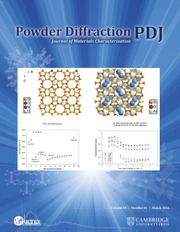Article contents
X-ray diffraction and density functional theory studies of R(Fe0.5Co0.5)O3 (R = Pr, Nd, Sm, Eu, Gd)
Published online by Cambridge University Press: 20 September 2016
Abstract
The structure of a series of lanthanide iron cobalt perovskite oxides, R(Fe0.5Co0.5)O3 (R = Pr, Nd, Sm, Eu, and Gd), have been investigated. The space group of these compounds was confirmed to be orthorhombic Pnma (No. 62), Z = 4. From Pr to Gd, the lattice parameter a varies from 5.466 35(13) Å to 5.507 10(13) Å, b from 7.7018(2) to 7.561 75(13) Å, c from 5.443 38(10) to 5.292 00(8) Å, and unit-cell volume V from 229.170(9) Å3 to 220.376(9) Å3, respectively. While the trend of V follows the trend of the lanthanide contraction, the lattice parameter “a” increases as the ionic radius r(R 3+) decreases. X-ray diffraction (XRD) and transmission electron microscopy confirm that Fe and Co are disordered over the octahedral sites. The structure distortion of these compounds is evidenced in the tilt angles θ, ϕ, and ω, which represent rotations of an octahedron about the pseudocubic perovskite [110]p, [001]p, and [111]p axes. All three tilt angles increase across the lanthanide series (for R = Pr to R = Gd: θ increases from 12.3° to 15.2°, ϕ from 7.5° to 15.8°, and ω from 14.4° to 21.7°), indicating a greater octahedral distortion as r(R 3+) decreases. The bond valence sum for the sixfold (Fe/Co) site and the eightfold R site of R(Fe0.5Co0.5)O3 reveal no significant bond strain. Density Functional Theory calculations for Pr(Fe0.5Co0.5)O3 support the disorder of Fe and Co and suggest that this compound to be a narrow band gap semiconductor. XRD patterns of the R(Fe0.5Co0.5)O3 samples were submitted to the Powder Diffraction File.
Keywords
Information
- Type
- Technical Articles
- Information
- Copyright
- Copyright © International Centre for Diffraction Data 2016
References
- 6
- Cited by


